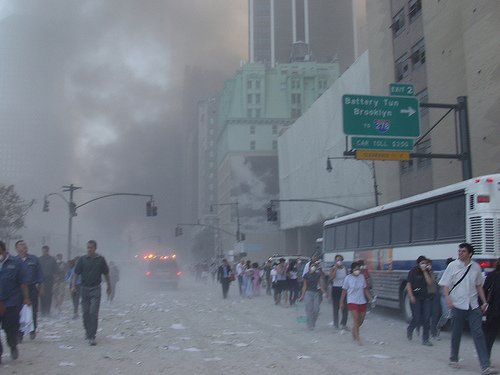
For the first time since the 9/11 attack, the federal government is on the verge of recognizing that people who lived near Ground Zero and first responders got cancer from toxic dust from the scene.
The National Institute for Occupational Safety and Health is expected to announce the findings on the 11th anniversary of the terrorist attack tomorrow.
The institute is responsible for deciding whether cancer should be among the illnesses covered by the James Zadroga 9/11 Health and Compensation Act.
Around 50 cancers are expected to be included.
The ruling will mean thousands of people who are sure they got sick in the aftermath of the outrage will be eligible for compensation.

Michael Barasch, a lawyer who represent thousands of first responders and residents, told the New York Post: “There’s new scientific evidence that dust is what is now linked to not only the respiratory illnesses, but all these cancers.”
John Walcott, an NYPD detective who was diagnosed with leukemia in 2003 after working months at Ground Zero and the Fresh Kills landfill said: “It’s a bittersweet thing. It took 11 years to do what should have been done a long time ago.”
The Zadroga Act – named after NYPD Detective James Zadroga, who died age 34 after working on the World Trade Center pile – was passed into law two years ago.
Under the Act $2.8 billion was set aside to compensate people made ill by exposure to toxins at the site. Another $1.5 billion has been allocated over five years to fund the World Trade Center Health Program, which treats and monitors about 40,000 first responders.
It originally did not cover cancer because there was not enough evidence linking it to the toxins emitted at Ground Zero.
“To me, it’s common sense. If you breathe in toxic fumes, you’re going to get cancer,” said U.S. Rep Carolyn Maloney, a Manhattan Democrat who helped author the bill.
But even Carolyn Maloney conceded that it is difficult to find hard data proving the connection between cancer and the dust at ground zero. That’s why in crafting the Zadroga Act, lawmakers were careful to include mechanisms that would allow for illnesses to be added based on new scientific research.
This was despite thousands of responders claiming top be sick because of their part in the rescue efforts.
About 400 first responders or people who lived near the site have died from cancer since 9/11, according to the most recent estimates.
With the inclusion of cancer in the program, there will be more victims seeking compensation yet no increase in the $2.77 billion fund – meaning individual rewards will be lower.
Thomas Gilmartin, a smoker who suffers from lung disease and sleep apnea, told the Post: “They’re going to add cancers, but are they going to add more money to the fund?
“It’s crazy. Every time, we gotta fight. It’s two years since Obama signed that bill and nobody’s got ten cents.”
The Victim Compensation Fund’s special master, Sheila Birnbaum, has been responsible for evenhandedly distributing $2.7 billion to Ground Zero responders and others who became ill after being exposed to dust and ash from the smoldering ruins of the World Trade Center.
She will be permitted to spend only $875 million of the fund’s total in the first five years after the initial payments begin.
After those five years pass, people with valid claims will begin to receive their remaining portion of the additional $1.9 billion.
In the two years since the law was passed, about 40,000 responders and survivors receive monitoring and 20,000 get treatment for illnesses as part of the World Trade Center Health Program.
With time still left to submit claims, some people are holding out in the event that they become sick in the near future. Others are waiting until the National Institute for Occupational Safety and Health officially adds 14 broad categories of cancer to the list of conditions covered by the fund.
Recently diagnosed with leukemia and lymphoma, 55-year-old Brian Casse hopes he can secure money from the fund to support his wife and children in case he takes a turn for the worst.
Brian Casse, a retired firefighter who helped clear away the mountain of rubble at ground zero, believes there’s little doubt his work at the site is responsible for his illness.
“You’ve got people in this city who went down there and did what we had to do. And a lot of us got sick because of it,” Brian Casse said.
“To make us now fight for this money, it’s not right. In the grand scheme of things, this money’s a drop in the bucket.”
Jeff Stroehlin was one of 40,000 construction workers, firefighters and police officers who worked tirelessly on what became known as the Pile, the mountain of debris that had been the twin towers of the World Trade Center.
In March 2011, Jeff Stroehlein was diagnosed with a rare lymphoma, a cloud-like mass on the front of his brain.
The tumor was unusual in being a primary, the disease commonly spreading to the brain from another part of the body.
He underwent months of chemotherapy and a bone marrow transplant last August.
His last four MRIs have showed no sign of the cancer, he told Long Island Newsday, but he fears it is only a matter of time until it comes back.
“This isn’t just for me,” he said of the coverage.
“This is for everybody else. First of all, I’m lucky enough to be talking to you. But what about the guy who could lose his house trying to pay his medical bills?”